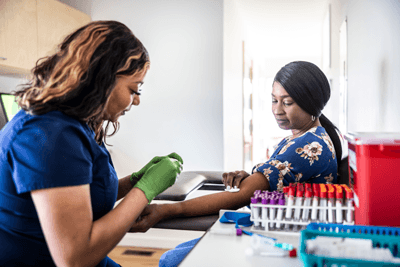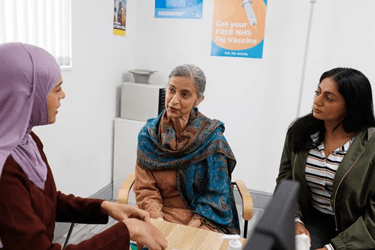Treatment for cancer
Doctors use samples of your blood or some of your cancer cells, to collect information.
Your doctor might use personalised medicine:
to find out if you have a high risk of getting cancer and if you need screening or treatment to reduce this risk
to decide what is the best treatment for your cancer
to check if you have a high risk of side effects from your treatment
to work out the risk of your cancer coming back
as part of a clinical trial
There are different kinds of test used in personalised medicine.
Genetic tests look for specific changes (mutations) in individual genes (DNA) in your body. These check if you have a higher chance of developing a certain cancer. You usually have a blood test for genetic testing. An example of genetic testing is when specialists test for gene changes that are inherited in family members.
Cancer cells have changes in their genes (DNA) that make them different from normal cells. Genomics is the study of all the information in the cancer DNA. So genomic testing looks for gene changes in your cancer. Your doctor usually uses a blood test, or a sample (biopsy) of your cancer to do this.
Proteins are responsible for most of the work a cell does. For example, they might stop damaged cells from reproducing or tell cells when to grow. Sometimes cancer cells might produce too much of certain proteins or stop them working properly. Protein testing can look for these changes. Your doctor usually uses a sample (biopsy) from your cancer to do this.

Some people have a in one of their genes which can increase their risk of certain types of cancer. If you have a very strong family history of one of these types of cancer, your doctor might offer you a genetic test. This can tell you if you have an inherited faulty gene.
If you do have a faulty gene your doctor might offer you:
regular screening
surgery or medicine to reduce the risk of developing the cancer
Find out more about inherited cancer genes
Depending on your situation, your doctor might send a sample of your cancer cells to the laboratory for tests. These tests might look for:
gene changes as part of genomic testing
certain proteins on the surface of cancer cells
Your doctor can use the results of these tests to help them decide on the best treatment for you. Depending on any proteins or gene changes in your cancer, they might be able to give you immunotherapy or targeted cancer drugs. Targeted cancer drugs work by ‘targeting’ the differences that help a cancer cell to survive and grow. Immunotherapy uses our immune system to fight cancer. There are many different types of targeted cancer drugs and immunotherapies. They all work in different ways. They include:
monoclonal antibodies
growth blockers
PARP inhibitors
checkpoint inhibitors
anti- Angiogenic treatment
CAR T-cell therapy
Read more about targeted cancer drugs and immunotherapy

Doctors already use personalised treatments for a number of cancers. We have included some examples below.
Fluorouracil (5FU) and capecitabine are two common chemotherapy drugs. They are used as a treatment for several different cancers. An called DPD helps our body to break these drugs down.
Without enough DPD enzyme, these drugs build up in the body and cause more severe side effects than usual. In some situations, these side effects can be life threatening.
Before starting treatment with capecitabine or fluorouracil, you have a blood test to check your levels of DPD. The results tell your doctor if you need treatment with a lower amount (dose) of the drug or if you should have a different treatment.
Read more about DPD deficiency
If you have breast cancer, your doctor might suggest you have specialist gene tests on your cancer cells. The results of these tests give your doctor information about whether chemotherapy can lower the risk of your cancer coming back.
There are different types of these tests for breast cancer. They include:
Oncotype DX Breast Recurrence Score
Prosigna
Read more about tests on your breast cancer cells
There are a number of companies that offer private tests to people with cancer. They use the results of these tests to recommend personalised treatment. Talk to your healthcare team if you are thinking about paying for testing of this kind. Ask them if these tests are suitable for your type of cancer and your situation.
The NHS and HSC (in Northern Ireland) don't always accept the results of private tests, so it is worth checking this with your cancer specialist.
Researchers in the UK and around the world continue to look into personalised medicine. They hope to:
find out more information about the genetic makeup of each cancer
develop new tests that can look for gene changes
develop new treatments that target a particular gene change
Stratified medicine means looking at large groups of people to find out which treatments will work on which cancers. It’s one step towards personalised medicine.
Cancer Research UK launched a stratified medicine programme in 2010. In the first part of the programme, researchers collected samples from around 9,000 people with different types of cancer. They looked at the different genetic changes in the samples.
This study led to the next part of the programme, called SMP2. This tested for genetic changes in non-small cell lung cancer (NSCLC). Based on the gene changes found, some people were able to take part in the National Lung Matrix trial. Those taking part had treatment depending on specific changes to genes in their cancer cells.
Read more about the Lung Matrix trial
The 100,000 genomes project is an NHS research project. It aims to look for the genetic causes of cancer and other rare diseases in a large number of people.
Everyone who took part gave a sample of blood, saliva or tissue. Researchers tested these samples to look at all the genes inside the cells. This information is being stored in a secure national library. Approved researchers can access this information to study diseases and look for new treatments.
Find out more about the 100,000 genomes project
Personalised vaccines are also called mRNA vaccines. mRNA carries messages from our genes that tell cells what type of protein to make.
Researchers think they can give people with cancer a small piece of mRNA from their own cancer cells. This helps the cells of the immune system better recognise and destroy cancer cells.
This is still a new treatment. It is only available in clinical trials.
Find out more about cancer vaccines
Unfortunately, no one can guarantee that treatment will work even when you had tests to look for gene changes. A treatment might not work because there are other changes in the cell we don’t know about, or don’t have a test for yet.
Your doctor will monitor you during and after treatment to check how well it is working.
We will find out more about which treatments work with these and other cell changes as we continue with this area of research.
Cancer Research UK is working with the NHS, pharmaceutical and medical companies. We aim to develop more tests and treatments and make them available in the NHS.
Read more about the research that Cancer Research UK is doing
Last reviewed: 02 Feb 2026
Next review due: 02 Feb 2028
Our clinical trials aim to find out if a new treatment or procedure is safe, is better than the current treatment or helps you feel better.
There are many cancer drugs, cancer drug combinations and they have individual side effects.
Search for the cancer type you want to find out about. Each section has detailed information about symptoms, diagnosis, treatment, research and coping with cancer.
Treatments can include surgery, radiotherapy and drug treatments (such as chemotherapy, hormone therapy or targeted cancer drugs). Find out about treatments and how to cope with side effects.
This page has been written, reviewed and updated by Cancer Research UK’s Patient Information Web Team. Thanks to the expert medical professionals and people affected by cancer who have helped to review this information.
Dr Emily Scott (Clinical Oncology Registrar and Genomic Medicine Clinical Advisor)

About Cancer generously supported by Dangoor Education since 2010. Learn more about Dangoor Education
Search our clinical trials database for all cancer trials and studies recruiting in the UK.
Connect with other people affected by cancer and share your experiences.
Questions about cancer? Call freephone 0808 800 40 40 from 9 to 5 - Monday to Friday. Alternatively, you can email us.